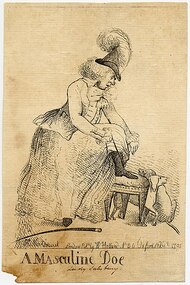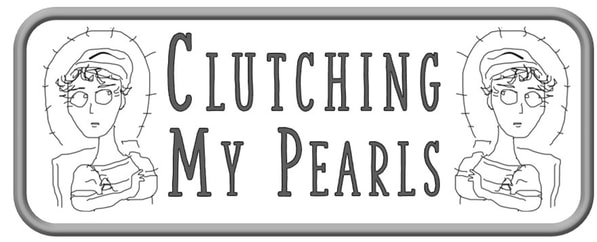| Clutching My Pearls explores Jane Austen and contrasts her works with the tropes of other novels of the long eighteenth century. Click here for the first in the series. For some forgotten female authors, click "Authoresses" at the right. |
 "A Masculine Doe," 1792
"A Masculine Doe," 1792 These fools and freaks were often stock characters. In earlier posts, I wrote about some common 18th century stock characters such as the saucy sidekick, fops and fools, and the female pedant.
Here’s another comic stereotype, played for laughs (that is, for derision), who would have been instantly recognizable to novel-readers of the past: the Amazon. Both Maria Edgeworth and Fanny Burney created comic Amazon characters but I can’t think of any female character in Austen who is an Amazon.
Amazons were women with masculine traits. They walked, gestured, and spoke loudly and emphatically. They dressed in riding habits. They were obsessed with horses and loved dogs. They are usually anti-intellectual. They prefer male company to female, but in several cases, they are the matrimonial dupes of fortune-hunters.
Amazons looked down their noses at feminine women. Often they are paired with a languid, lazy, woman, both of them serving as a contrast to the heroine.
Susan Elworth, the heroine of Anne Raikes Harding’s Corrections (1818), is “disgusted” with the entire Williamson family and finds the two daughters of the family “just bearable”: “The youngest, a fair insipid looking tall girl, had a passion for being thought a languid beauty. She closed her eyes, lounged on a sofa, lisped out her words in the softest tone imaginable, smiled with the silliest air in the world, which she mistook for interesting sweetness, [and] was always fatigué.
“The eldest daughter…. was very different. She would be a dasher! So she talked loud and fast, rode on the dickey with the coachman, hunted with all the gentlemen in the county, laughed loud, [and] talked in knowing terms…”
| The best-selling novel A Winter in London (1806) contrasts the beauty of the Duchess of Belgrave with the Duchess of Drinkwater who “was truly masculine in form and feature, coarse in her complexion, and unmeaning in her countenance." “The Duchess of Belgrave spoke with the persuasive eloquence of a seraph smile, in a voice sweet as the notes of the nightingale: the Duchess of Drinkwater bellowed her commands with lungs of a boatswain;--the one rode, walked, danced, entered a room, joined company, or retired, always with the elegantly easy dignity of a woman of quality; the other rode like a market-woman, walked like a grenadier, and danced like the witches in Macbeth; she would burst into a parlour with the rudeness of an exciseman into a wine-cellar, break up a conversation by an obtrusive loud horse-laugh; and march away from a party in the middle of a question specially addressed to herself.” Another Amazon in this novel, Lady Jane Johnstone, is the widow of an Irish baronet, devoted to “the turf” and “the field.” Like other Amazons, she is contemptuous of weaker women: “half the insipid things you see mounted on horses ride for parade instead of exercise… Zounds, what’s the use of an animal with blood in it, like this mare of mine, to such poor puppets as those!” She challenges some male friends to a race: “What say you to a wager, gentlemen... you perceive there’s nothing showy about this mare; but I’ll gallop her against Lord Barton’s galloway, or the Marquis’s roan gelding, for any sum you’ll name, from a hundred to a thousand!” | The Nancy Drew series continued the tradition of contrasting the heroine with an ultra-feminine girl (Bess Marvin) and a tomboy (George Fayne). |
 The Chevalier D'Eon, a famous cross-dresser (1728 – 1810)
The Chevalier D'Eon, a famous cross-dresser (1728 – 1810) Some gentlemen in Fanny Burney’s Evelina (1778) declare they want nothing to do either with Amazons or tiresomely intellectual female pedants: “But I am a sad weak creature—don’t you think I am, my Lord?” exclaims Lady Louisa kittenishly as she turns down an offer to go for a walk.
“O, by no means, [answered Lord Merton], “your Ladyship is merely delicate; --and, devil take me, if ever I had the least passion for an Amazon.”
“I have the honour to be quite of your Lordship’s opinion, [said Mr. Lovel]; for I have an insuperable aversion to strength, either of body or mind, in a female.”
“Faith, and so have I, (said Mr. Coverley); for, egad, I’d as soon see a woman chop wood, as to hear her chop logic.”
Amazons and female pedants are contrasted in several novels, including 1831’s Mrs. Armytage. The lovely Rosamund lives with three spinster aunts. One is a female pedant, one is a hypochondriac, and the third is an Amazon. While the pedant aunt scolds Rosamund for neglecting her education and the hypochondriac warns her to never expose herself to the sun or the rain, Mistress Di berates Rosamund for being a coward. “Trotting along the high road to Thoroton on her favourite bay, sixteen hands high, with her straight grey hair escaping from a napless [ie old and threadbare] beaver [hat], she might have been mistaken for Talleyrand in a riding habit." The author, Catherine Gore, also compares Mistress Di, “habited in her usual Amazonian fashion,” to the Chevalier D’Eon.
 In Greek stories, Amazons were a legendary race of female warriors
In Greek stories, Amazons were a legendary race of female warriors Lady Diana, true to form, has “bold horsemanlike manners… Her look was almost an oath—her language was suitable to her looks—she swore, and dressed to the height of the fashion—she could drive four horses in hand—was a desperate huntress-and so loud in the praises of her dogs and horses, that she intimidated even sportsmen and jockeys.” She can mount her horse without the assistance of a man.
Lady Di “rode over from Cheltenham” to visit the fashionable young Lady Augusta, lends her favourite horse Spanker for Lady Augusta to ride, and scolds her “for God’s sake not to be such a coward!” But Spanker is skittish and almost throws Lady Augusta off his back. Lady Di beats the horse into submission: “in vain the spectators entreated the angry amazon to spare the whip.” Of the spectators, only Lord George is impressed and gives her “a hearty shake of the hand.” Lady Augusta is too shaken to resume her seat on the now-subdued horse.
“How can you talk so like a child;--so like a woman!” cried [Lady Di]. Her “masculine intrepidity and disgusting coarseness” displeases the hero of the tale, Mr. Mountague, who initially finds himself drawn to the delicate and shrinking Lady Augusta, although she is, in fact, putting on a bit of a show for him.
An Amazon is one of the gallery of eccentrics in the novel Metropolis (1811) by Eaton Stannard Barrett. Lady Spanker appears "dressed in a riding-habit, with laced-half boots, a spur on her left heel, and a whip in her hand; she was a fine figure, and her face still evinced her youthful beauty; but it was masculine, sun-burnt, and strongly partook of the energies of her mind. She lounged through the room (and) talked loud….”
| A 1786 book about Fanny Davies, “the celebrated Amazon,” may or may not be a true story, but it involves a woman of the town who had many lovers and engaged in various swindles. She also wore men’s clothing and hunted, presumably without the side-saddle. | In Charlotte Smith’s Ethelinde, or the Recluse of the Lake (1790), the heroine’s languid sister-in-law is contrasted with her horse-loving cousin MIss Newenden, who has her own estate and income: “Yet neither the person or manners of Miss Newenden were calculated to attract esteem or admiration; her person, without being tall, was hard and masculine; her features, though not large, were sharp and harsh; and from being constantly exposed to the air, her complexion had contracted an unpleasant redness, particularly about her nose and forehead, that gave it a certain coarseness…” In a subplot of the novel, Miss Newenden is courted and won by a ne’er do well who burns through her money and abuses her. Abandoned by her husband, she is rescued by her brother, who secures an income to her. Rosalie, the heroine of The Mystic Cottager of Chamoney (1795) is “astonished” to learn that her neighbour Georgina Villars actually “can whistle vastly well,” and “she leaps a five-barred gate better than any woman in England." “To the men [Miss Villars] was a general object of derision—to the women, a disgusting Amazonian." |
 A real-life "petticoat duel" in 1792 in Hyde Park
A real-life "petticoat duel" in 1792 in Hyde Park However, it seems clear that most portrayals of Amazons in the 18th century are intended to hold this type of woman up to ridicule.



 RSS Feed
RSS Feed